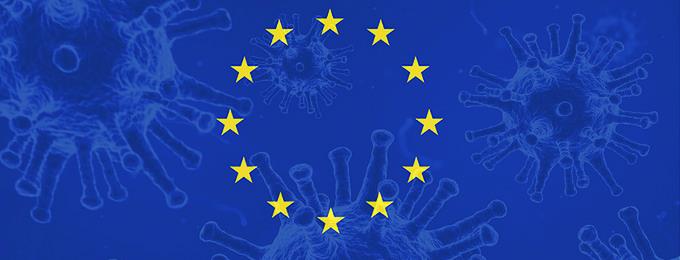The EU is facing urgent financial questions about helping its society and economy struck by COVID-19, how to adjust the MFF, and planning its economic recovery.
After the actions taken from late January through March (see SwissCore article), the European Commission (EC) continues to ramp up its research and innovation response against the coronavirus. On 7 April, research and innovation ministers adopted the EC’s proposal for a short-term coordinated research and innovation ERAvsCorona Action Plan. Switzerland participates in the actions due to its membership in the European Research and Innovation Area (ERA). The immediate actions include the establishment of a European data exchange platform for all coronavirus-related R&I information (see SwissCore article). The European Institute of Innovation and Technology (EIT) activated its large community to find innovative solutions against the coronavirus (see SwissCore article). The EU also uses its research and innovation funding instruments to leverage artificial intelligence against COVID-19 in the search for ways to limit the spread, and develop treatments and a vaccine (see SwissCore article). And, the discussions for further research and innovation action continue: In a videoconference meeting with the European Parliament’s (EP) research and industry committee (ITRE), Commissioner Mariya Gabriel mentioned in the context of the preparation of Horizon Europe that “we are looking directly at whether or not we need an additional European partnership on pandemic preparedness and societal resilience”.
The coronavirus outbreak is dominating the EU’s political agenda on all levels, as it happens currently everywhere around the globe. Decision makers are trying to look ahead and analyse possible fallouts that the corona crisis could have on the EU’s political objectives – and on research, innovation and education. Elisa Ferreira, European Commissioner for Cohesion and Reforms, warned against abandoning the new path towards a green and digital growth strategy in the aftermath of the corona crisis. An important concern is about possible repercussions on budgets. Robert-Jan Smits, the former Director-General of DG Research and Innovation (RTD), mentioned at a Science|Business webcast meeting in late April that “the departments which are cut most often in times of crisis by companies are R&D departments”. This would also affect universities that work closely with industry.
After three meetings in March, the European Council met again for a video conference on 23 April to discuss the crisis, and especially the important financial topics: Financial support to Member States in the short run, the next Multiannual Financial Framework (MFF) 2021-2027, and additional post-corona recovery funding in order to rebuild the EU’s economy. Furthermore, the heads of states or government also discussed coordinated strategies to lift the lockdown measures.
Regarding the short-term aid, the leaders endorsed the Eurogroup’s agreement that includes three safety nets for workers, businesses and sovereigns with a total budget of EUR 540 billion. The heads of state or government called for the aid package to be operational by 1 June 2020. Furthermore, the European Council welcomed the Joint European Roadmap towards lifting COVID-19 containment measures that the President of the European Council, Charles Michel and EC President von der Leyen presented on 15 April. The document recognises that the speed of the lifting of containment measures must be gradual, science-based and that proceeding in a coordinated way is in the common European interest.
Furthermore, the European Council discussed the crucial topic of the MFF for 2021-2027, which has proven to be a difficult issue over the past months to find common ground. Michel said after the meeting that the MFF will “need to be adjusted to deal with the current crisis and its aftermath”. The EC is expected to present a new, adapted MFF proposal in the coming weeks. At the same time, the EU leaders agreed that also a recovery fund will be necessary to bring back Europe’s post-corona economy. The EC was asked to analyse the exact needs for such a fund and to urgently come up with a proposal. Michel emphasised that “this fund shall be of a sufficient magnitude, targeted towards the sectors and geographical parts of Europe most affected, and be dedicated to dealing with this unprecedented crisis”. The EC’s proposal for the new recovery fund should also clarify the fund’s link with the MFF. He emphasised that “we remain committed to giving the necessary impetus to work on the recovery fund as well as the MFF, so that a balanced agreement on both can be found as soon as possible.”
The European leaders welcomed the Joint Roadmap for Recovery, prepared by Presidents Michel and von der Leyen. The recovery plan defines four key areas for action: A fully functioning Single Market, massive investment efforts, EU global action and better governance. Michel, in his conclusions after the video conference, emphasised that “it is of utmost importance to increase the strategic autonomy of the Union and produce essential goods in Europe”. The document also highlights the importance of investing in the green transition and the digital transformation – two objectives that depend heavily on strong education, research and innovation landscapes. Also the EP calls for a focus on green and digital investments in the EU’s recovery plan and ITRE Chair Cristian Bușoi said: “More investment in research can be a driver for the recovery, with a focus on innovation and data.”

